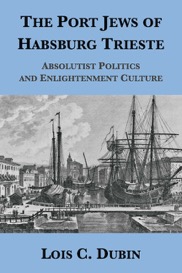 $9.99 on Kindle, Nook, Apple Books, Kobo, Google Play
$9.99 on Kindle, Nook, Apple Books, Kobo, Google PlayThe Port Jews of Habsburg Trieste: Absolutist Politics and Enlightenment Culture by Lois C. Dubin (143,000 words, 11 illustrations) Published by arrangement with Stanford University Press.
Winner of the 2000 Barbara Jelavich Prize in Habsburg, Russian or Ottoman history (American Association for the Advancement of Slavic Studies) and finalist in the 1999 National Jewish Book Awards, History category.
“Dubin’s brilliant study of the cosmopolitan entrepôt of goods and peoples that was Trieste breaks new ground in our understanding of Jewish life in the Old Regime Europe. It demonstrates with exacting detail the extensive privileges such ‘port Jews’ enjoyed and the effect enlightened absolutism and emancipation politics exercised upon them, while skillfully portraying the Jews’ political and cultural responses. It is a classic study in modern Jewish history.” — David Sorkin, University of Wisconsin, Madison
“Lois C. Dubin has produced a solid and original monograph that explores the economic, legal, political, and cultural changes experienced by Trieste’s Jewish community within the context of the reform policy of the Austrian enlightened absolutists and Enlightenment ideology... Dubin has written an outstanding work on Trieste’s Jews... a very valuable study that I recommend to any reader interested in Jewish and Habsburg history, as well as the Enlightenment.” — Alexander Grab, The American Historical Review
“[A] valuable and carefully researched book... Dubin’s book is an important contribution not only to the study of Habsburg Jewry but also to our understanding of eighteenth-century absolutism.” — James Van Horn Melton, The Journal of Modern History
“The book is replete with keen insights into the experiences of European Jews during the initial phases of the transition from the world of corporate orders to modern class society... Dubin's discussion of the dynamics of Haskalah in Trieste is a sophisticated and nuanced analysis of one of the crucial chapters in the modernization of European Jewry.” — Robert Weinberg, Journal of Urban History
“With this superb book, Lois C. Dubin has successfully and elegantly slain the two-headed dragon of modern Jewish historiography: nationalism and Germanocentrism. She has also provided Habsburg historians with a much-needed treatment of the complex interaction between state-building, reforming absolutism and the Jews, one of several significant ‘national minorities’ within the heterogeneous empire... The essential economic role played by Triestine Jewry once Charles VI declared Trieste a free port in 1719 made them indispensable to the Habsburg state. This indispensability itself is a critical marker in the shift between medieval and early modern Jewish history. What had been a liability, Jewish predominance in middle-class professions, particularly in trade, became an asset with the rise of mercantilism and a state-centralized economy. Coupled with the distinctive culture of Italian Jews, toleration shaped the ways in which Triestine Jews responded to Josephinian reforms, the Jewish Enlightenment in Berlin, challenges to Jewish marriage and divorce law, educational changes, and the dissolution of the ghetto, all of which Dubin explores with nuance and clarity... The Port Jews of Habsburg Trieste employs source material in all the essential languages, German, Hebrew and Italian, and Dubin is equally at home analyzing Viennese and Triestine archival material and rare Hebrew periodical literature published in Vienna and Berlin. Her assured use of such diverse materials is also welcome because it restores historical agency to the Jewish population which is at the center of her study... The Port Jews of Habsburg Trieste will undoubtedly remain the classic treatment of this fascinating city and of Habsburg state-building in one of its most important ports.” — Nancy Sinkoff, H-Net
“[T]hanks to the publication of Lois Dubin’s outstanding book, The Port Jews of Habsburg Trieste, our understanding of the forces that shaped modern Jewish society and culture has been advanced appreciably. Dubin has succeeded in producing a balanced reassessment of much of the conventional thinking about periodization, modernization, and the role of Haskalah and Emancipation... Dubin offers readers entrée into a world that is rarely seen from up close. An elegantly written work of mature and thorough scholarship, The Port Jews of Habsburg Trieste represents a critically important contribution to understanding the multifaceted and multitextured interaction of the state and the Jewish community at the dawn of the modern era.” — Jay R. Berkovitz, Association for Jewish Studies Review
“Lois Dubin has written a fascinating study of a Jewish community on the periphery that provides us with a new perspective for understanding the history of eighteenth-century European Jewry and the process of modernization of Jewish life... The Port Jews of Habsburg Trieste is... both a perceptive study of a hitherto relatively obscure Jewish community on the Adriatic and a microcosm of the early modern Jewish experience in Europe. I recommend it highly, whether as an innovative and thought-provoking introduction to eighteenth-century Jewish history or as a refresher course with a different twist.” — Harriet Pass Freidenreich, Central European History
“Dubin’s judicious sensitivity to each of many colliding cultures in the free port, and to divisions and adaptations within those cultures, enables her vision of Trieste as a kind of laboratory of late enlightened absolutism.” — Christine Mueller, The Journal of Interdisciplinary History
“Dubin has made here an important contribution that belongs in every library that addresses Judaism and the modern world.” — Paul S. Spalding, German Studies Review
“[Un] travail magistral.” — Sylvie Anne Goldberg, Annales: Histoire, Sciences Sociales
“[A] work of genuine significance... an exemplary study.” — Michael A. Meyer, Choice Magazine
“Ce livre restera désormais pour longtemps une référence indispensable.” — Georges Weill, Revue des Études Juives
“[U]n ouvrage remarquable attendu depuis longtemps et qui ne déçoit pas... Une superbe monographie.” — Dominique Bourel, Dix-huitième Siècle



